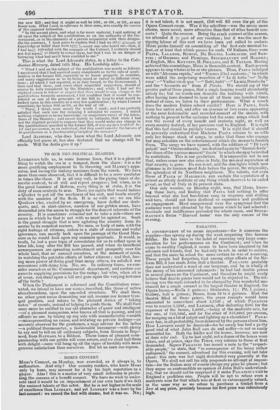- MORI'S CONCERT.
Morn's Concert, on Monday, was crowded, as it always is, to suffocation. And why ? Our country readers, who know Mom only by fame, may account for it by his high reputation as a player. Alas ! , this is a matter of very small influence in produ- cing.the success of a benefit concert. We have no wish to under- rate (and it would be an impeachment of our own taste if we did) the eminent talents of this artist. But he is not higher in the scale of excellence than LINDLEY, and yet LINDLEY was a loser by his lastconcert: we record the fact with shame, but it was so. No; it is not talents it is not merit, that will fill even tha pit of the
Opera Concert-room. Was it the selectionwas the mbsic more choice, more novel, more attractive than find of Other benefit con-
certs? Quite the reverse. Being the crack concert of the season, we attended it as part of our vocation ; but it was the most fa- tiguing labour of this sort we have been yet called to endure. Moar prides himself on assembling all the first-rate musical ta- lent, or at least that which passes for such. Of Italians, there were PASTA, .LALANDE, RUBINI, DE BEGNIS, LABLACHE. and SAN.. TINI ; of Germans and Flemings, STOCKHAUSEN and BEGREZ of English, Mrs. KNYVETT, H. PHILLIPS, and E. TAYLOR. Having achieved this assemblage, MORI is therewith content. Each person appears to sing whatever he or she pleases. Thus, PASTA indulged us with "Ah come rapida," and" 11 soave il bel contento ;" to which were added the ,surprising novelties of " Jo di tutto "—" Nella, casa" —" Vadasi via di qua "—" Batti,batti"—" La mia Dorabella and the " favourite air" from 1? Pirata. We should say of the greater part of these pieces, that a single hearing would abundantly satisfy us; but no words can describe the loathing with which, after having been doomed to hear all of them one hundred times instead of once, we listen to their performance. What a wreck does the modern Italian school exhibit! Here is PASTA, fresh from her native soil, and after an absence of two years, appearing at the most fashionable and crowded concert of the season, with nothing to present to the audience but the same songs which had run the round of every benefit and oratorio night, as well as every country festival, at her previous visit to England. It is right that this fact should be publicly known. It is right that it should be generally understood that Madame PASTA returns to us with only her former stock of songs, in order that those who engage her may calculate on the entertainment which she means to furnish them. The songs we have named, with the addition of "Di tanti palpiti" and " Ombra. adorata," are destined again to "furnish forth" her share of the various musical" feasts" to which she may beinvited to contribute. This is our prediction. It is impossible not to see that, unless some new star arise in Italy, the musical reputation of that country is gone. Its sun is set, and the dim lights which now glimmer in its horizon must fade before the power, the originality, the splendour of its Northern neighbour. No talents, not even those of PASTA or MALIBRAN, can sustain the reputation of a school so utterly destitute of any thing which deserves to be called great, as that of Italy in its present state. Our only wonder, on Monday night, was, that MORI, know- ing these facts, and finding that PASTA had nothing to offer beyond what she had heretofore sung to sixpenny and shilling and tors, should not have declined so expensive and profitless an engagement. Most unequivocal were the symptoms that the audience were not attracted by the music which he had selected : lassitude and indifference pervaded the whole room, and STOCK- HAUSEN'S Swiss "Harvest home" was the only encore of the evening.


























 Previous page
Previous page